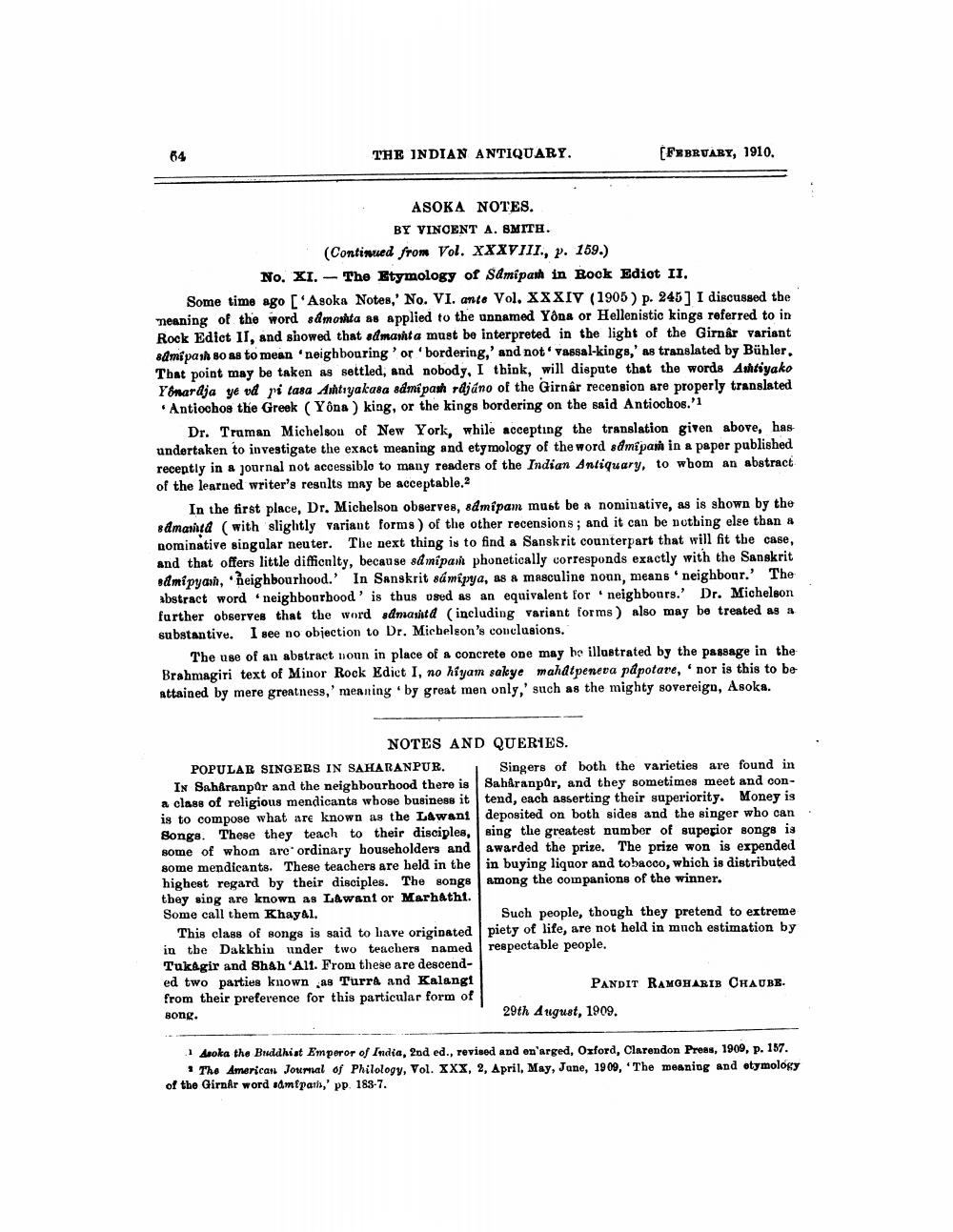________________
THE INDIAN ANTIQUARY.
[FEBRUARY, 1910.
ASOKA NOTES.
BY VINCENT A. SMITH. (Continued from Vol. XXXVIII., p. 159.)
No. XI. - The Etymology of Samipas in Rock Ediot II. Some time ago [ Asoka Notes,' No. VI. ante Vol. XXXIV (1905) p. 245] I discussed the meaning of the word sdmonta as applied to the unnamed YÔna or Hellenistic kings referred to in Rock Edict II, and showed that admanta must be interpreted in the light of the Girnar variant 8dmipash so as to mean neighbouring' or 'bordering,' and not. Vassal-kings,' as translated by Bühler, That point may be taken as settled, and nobody, I think, will dispute that the words Axtiyako Yonardja ye vd ri tasa Ahtiyakasa admi pash rdjáno of the Girnar recension are properly translated . Antiocbos the Greek (Yona) king, or the kings bordering on the said Antiochos.'1
Dr. Truman Michelson of New York, while accepting the translation given above, has undertaken to investigate the exact meaning and etymology of the word såmipan in a paper published recently in a journal not accessible to many readers of the Indian Antiquary, to whom an abstract of the learned writer's results may be acceptable.2
In the first place, Dr. Michelson observes, sdmípam must be a nominative, as is shown by the 8 dmarita (with slightly variant forms) of the other recensions, and it can be nothing else than a nominative singular neuter. The next thing is to find a Sanskrit counterpart that will fit the case, and that offers little difficulty, because sámipas phonetically corresponds exactly with the Sanskrit edmipyar, neighbourhood.' In Sanskrit sámipya, as a masculine noun, means neighbour.' The abstract word neighbourhood' is thus used as an equivalent for neighbours.' Dr. Michelson further observes that the word sdma itd (including variant forms) also may be treated as a substantive. I see no objection to Dr. Micbelson's conclusions.
The use of an abstract boun in place of a concrete one may be illustrated by the passage in the Brahmagiri text of Minor Rock Edict I, no hiyam sakye mahatpeneva päpotare, nor is this to be attained by mere greatness,' meaning by great men only,' such as the mighty sovereigo, Asoka.
NOTES AND QUERIES POPULAR SINGERS IN SAHARANPUR. Singers of both the varieties are found in In Saharanpur and the neighbourhood there is Saharanpur, and they sometimes meet and cona class of religious mendicants whose business it tend, each asserting their superiority. Money is is to compose what are known as the Lawant deposited on both sides and the singer who can Songs. These they teach to their disciples, sing the greatest number of superior songs is some of whom are ordinary householders and awarded the prize. The prize won is expended some mendicants. These teachers are held in the in buying liquor and tobacco, which is distributed highest regard by their disciples. The songs among the companions of the winner. tbey sing are known as Lawant or Marhatht. Some call them Khayal.
Such people, though they pretend to extreme This class of songs is said to have originated piety of life, are not held in much estimation by in the Dakkhin under two teachers named respectable people. Tuk&gir and Shah All. From these are descended two parties known as Turra and Kalangi
PANDIT RAMGHARIB CHAUBEfrom their preference for this particular form of song.
29th August, 1909.
Asoka the Breddhist Emperor of India, 2nd ed., revised and en'arged, Oxford, Clarendon Press, 1909, p. 137.
1 The American Journal of Philology, Vol. XXX, 2, April, May, June, 1900, 'The meaning and etymology of the Girnar word samfpath,' pp. 183-7.




